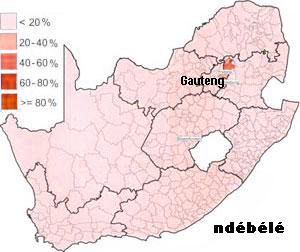Ndebele
 The term Ndebele, or amaNdebele, in the 1990s refers primarily to about 800,000 South Africans whose forebears have inhabited areas of the northern Transvaal (now Northern Province) for more than a century. The Ndebele language, isiNdebele, is classified among the Nguni languages, although Sotho influences are strong enough in some areas that isiNdebele is sometimes also classified as a variant of seSotho.
The term Ndebele, or amaNdebele, in the 1990s refers primarily to about 800,000 South Africans whose forebears have inhabited areas of the northern Transvaal (now Northern Province) for more than a century. The Ndebele language, isiNdebele, is classified among the Nguni languages, although Sotho influences are strong enough in some areas that isiNdebele is sometimes also classified as a variant of seSotho.
The Ndebele, sometimes called the Transvaal Ndebele to distinguish them from those of Zimbabwe, are Nguni in origin, but they had moved to the Transvaal long before Shaka's conquests sent other Nguni offshoots—among them the Zimbabwe Ndebele — to the north and east. Settling among Sotho peoples, different sections of the Ndebele have been variably influenced by Sotho language and culture. Two basic segments — the Northern and the Southern Ndebele — are commonly distinguished. The Southern Ndebele, perhaps three quarters of the group's total in Transvaal, have in general retained their Nguni language and many of their traditional ways; they were assigned to a separate homeland in 1978, but it had not yet been geographically defined in late 1980. The Northern Ndebele are largely North Sotho speaking and were officially assigned to the North Sotho homeland of Lebowa.
Most Ndebele trace their ancestry to the area that became Natal Province, later KwaZulu-Natal. Some began moving northward well before the early nineteenth-century mfecane, and many of these settled in the northern Transvaal. Others, subjects of the Zulu leader Mzilikazi, fled north from Natal after his defeat by Shaka in 1817. Ndebele peoples throughout the region were forced to move several times after that, so that by the end of the nineteenth century, the Ndebele were dispersed throughout much of Natal, the Transvaal, and adjacent territory.
Many Ndebele became formidable warriors, often subjugating smaller chiefdoms and assimilating them into Ndebele society, and Ndebele clashed repeatedly with Voortrekker militias around Pretoria. The late nineteenth-century Afrikaner leader Paul Kruger jailed or executed many of their leaders, seized their land, and dispersed others to work for Afrikaner farmers as indentured servants. Some of the land was later returned to a few Ndebele, often as a reward for loyalty or recognition of status.
Under apartheid, many Ndebele living in the northern Transvaal were assigned to the predominantly seSotho-speaking homeland of Lebowa, which consisted of several segiments of land scattered across the northern Transvaal. Others, mostly southern Ndebele, who had retained more traditional elements of their culture and language, were assigned to KwaNdebele. KwaNdebele had been carved out of land that had been given to the son of Nyabela, a well-known Ndebele fighter in Kruger's time. The homeland was, therefore, prized by Ndebele traditionalists, who pressed for a KwaNdebele independence through the 1980s.

KwaNdebele
KwaNdebele was declared a "self-governing" territory in 1981. Very few of its 300,000 residents could find jobs in the homeland, however, so most worked in the industrial region of Pretoria and Johannesburg. At least 500,000 Ndebele people lived in urban centers throughout South Africa and in homelands other than KwaNdebele through the 1980s.
During the 1980s and the early 1990s, many Ndebele recognized a royal family, the Mahlangu family, and the capital of KwaNdebele was called KwaMahlangu. The royal family was divided, however, over economic issues and the question of "independence" for the homeland. These disputes were overridden by the dissolution of the homelands in 1994. At that time, in addition to the estimated 800,000 Ndebele people in South Africa, nearly 1.7 million Ndebele lived in Zimbabwe, where they constituted about one-sixth of the population and were known as Matabele; about 300,000 lived in Botswana.
|
NEWSLETTER
|
| Join the GlobalSecurity.org mailing list |
|
|
|

